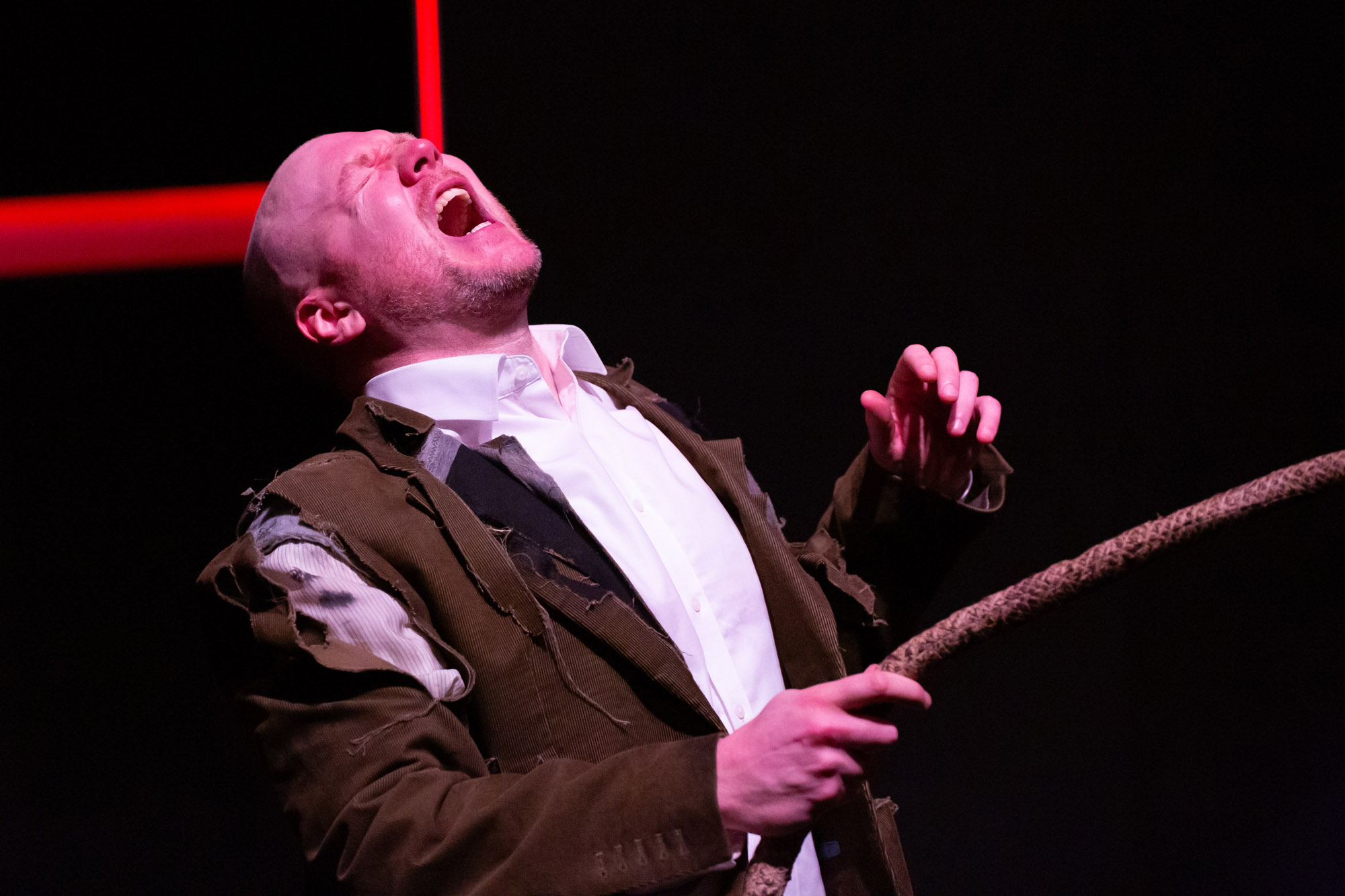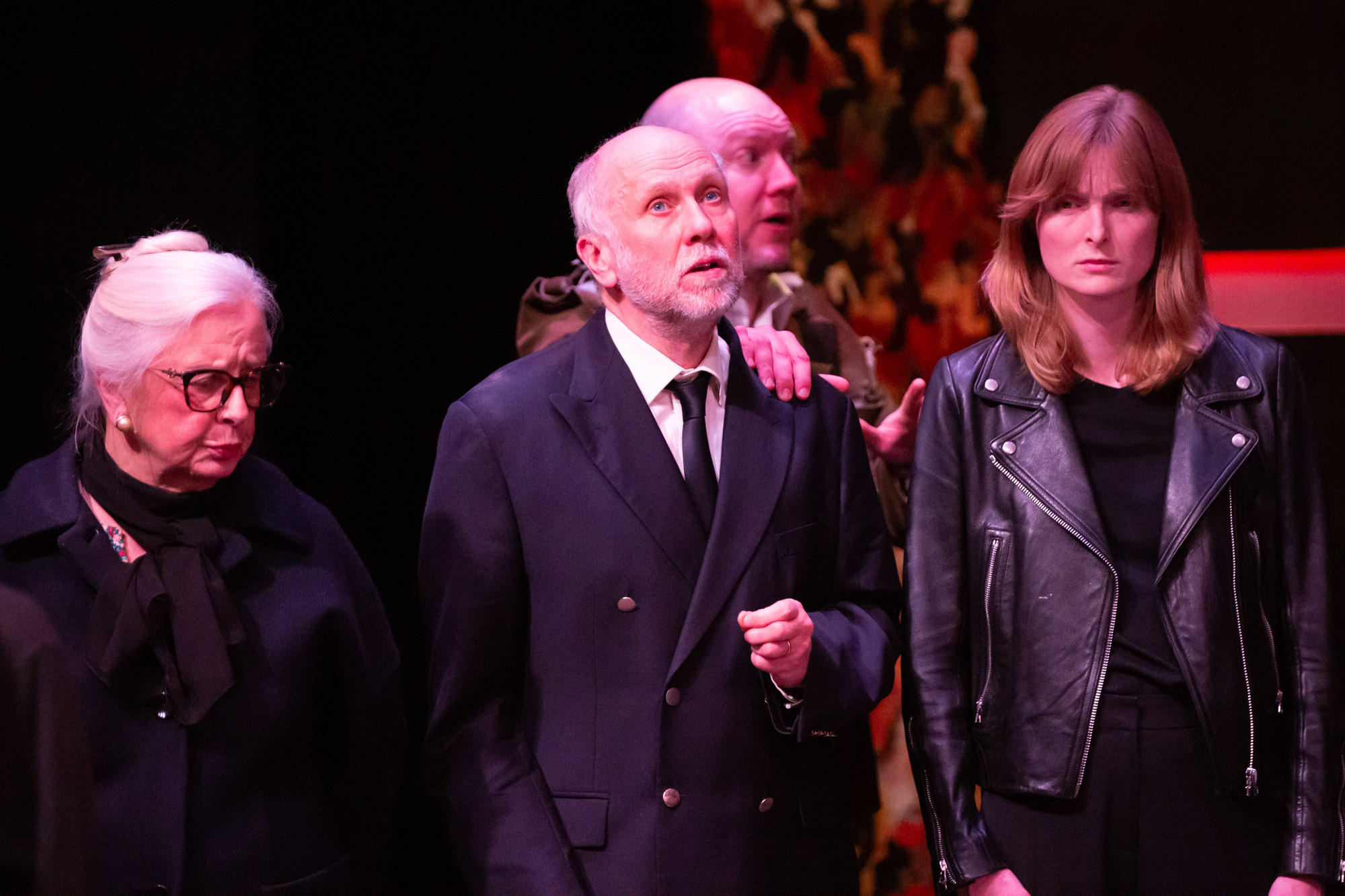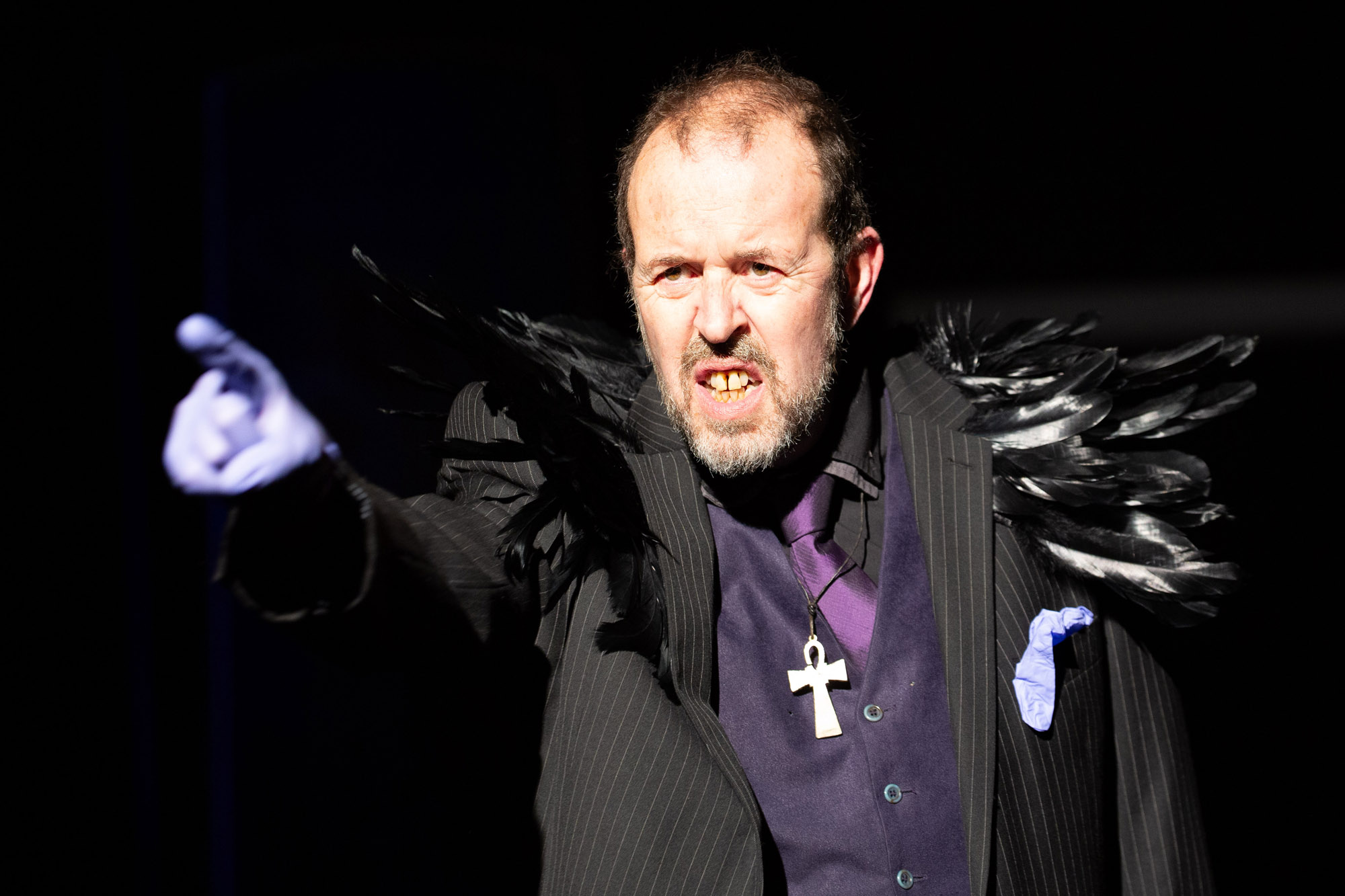Everyman
Information
- Date
- 27th March 2025
- Society
- Guildburys Theatre Company
- Venue
- The Electric Theatre, Guildford
- Type of Production
- Play
- Adapted by
- Carol Ann Duffy
Everyman is one of the world’s earliest plays, a morality play dating from the Middle Ages, and with versions in many different languages. It features a character who has succumbed to the temptations of the world, rather than living a good life, near to God. Death comes calling, and he must try to find redemption.
Carol Ann Duffy, for 10 years the UK’s Poet Laureate, adapted the play in 2015 for a production at the National Theatre. It now covers all the evils of the modern world, yet the play’s original basic truth still applies, it exhorts one to lead a better, less shallow life, to realise the real truths of life.
Great use was made of coloured neon strips for the simple set. The nightclub – Angels Bar – for the opening party scene had lilac-coloured bars of light, and a logo of a neon set of angel’s wings. A couple of red benches, and a low red table completed the set which was otherwise just black. The roof space was suggested by an arc of yellow light on the floor. The cleaning lady, who appeared first, had a bucket, mop, a dustpan and brush and so on, with which to clear up the horridly dirty floor. When Everyman visited his family, some cosy 1950s style armchairs were brought to the left of the stage for his elderly and infirm parents, together with the oxygen flask that his mother needed. Later a curtain covered in graffiti was pulled across to suggest somewhere like the South Bank, home to various down and outs. In the later scenes the angel’s wings were replaced by a yellow neon skull, and blue light bars. All very atmospheric and mysterious!
Costumes were in part very flamboyant, and delightful, especially for the party scene, some very colourful and sparkly outfits, fabulous! Everyman was clad in a dark red suit. The Cleaner/God was suitably dressed for her cleaning role. At one stage she appeared in a housecoat in a wheelchair, I wasn’t quite sure what that was about. Knowledge was a very ragged tramp, who at one stage swapped jackets with Everyman. Some shiny gold costumes made a big entrance as the representatives of all Everyman’s life consists of, money, fashion and so on. The finest costume by far was reserved for Death. A fine dark pin-striped suit, purple shirt, brighter purple tie, dark waistcoat, large crucifix, and a kind of yoke of black feathers – he was very intimidating indeed. He would pull on blue plastic gloves just before he dispatched people.
Lighting was excellent, for the party scene of course suitably exuberant, muted for many of the other scenes, with good use of spots. Sound was very effective. The sound of wind, of a hurricane or tornado, of the nightclub, and so on. There was a rather good song, began by Mother, and then gradually taken up by all, one after the other, accompanied by Death on the guitar.
A rather disgusting nightclub floor is tidied up by the world-weary cleaner, very matter of factly telling us what goes on there, what she has to clear away. She’s seen everything! The place fills up with revellers, dancing and partying away. When Everyman arrives though to celebrate his 40th birthday, he finds it deserted. His friends suddenly jump out of the shadows, and the wild occasion kicks off, with champagne, cocaine, dancing and general jollity and excess. People leave, Everyman passes out, and vomits into the bucket the cleaner carefully places before him. She’s seen it all before, of course, and as she speaks, we realise she is God.
As Everyman goes up onto the roof to get some fresh air, Death makes his first appearance. Everyman shrugs off this preposterous vision, it’s just a bad hangover. Death is persistent, so Everyman realises he needs to find someone to speak for him His ‘friends’ of course disappear, his thoughts turn to the family he has ignored for so long, so busy was he making money and having fun in the city.
His mother is totally over the moon at seeing him again. His sister, the sole carer for their parents less so. She’s angry at his neglect of the family, and at her situation, life being on hold as she cares at home. Everyman is shocked at his father’s increasing dementia and frailty, and horrified to discover that his mother is dependent on oxygen. His mother defends him, touchingly, as mothers will. Yet they don’t believe his predicament, as Death watches in the wings. David Hemsley-Brown gave a touching performance as the father, who communicates by means of rather apt remembered lines of poetry, always worried by the knock at the door. Pam Hemelryk’s mother was a loveable and believable one, desperate to cling onto her boy, reminiscing fondly, and so upset by the attitude of Everyman’s sister, played with great resentment and antagonism by Amy Carley. Yet none of them would accompany Ev on his journey, there was nothing they could do to help him, indeed they didn’t believe his story.
At one stage Ev is surrounded by gold-clad representations of his hunger for ‘stuff’, modern gadgets, posh holidays, flash homes, super new cars and so on. Consume, consume, consume, this has been his life. It will be difficult for him to give this all up. All this blatant consumerism, of course, is not just Everyman’s thing, it is dragging the whole world down, there was at one stage a great wind blowing rubbish all over the world, into the oceans, desperate times.
Everyman decides to relinquish all this and live a simple life with the unfortunates of this world. Here he meets Knowledge (Claire Racklyeft), a ragged tramp with pockets filled with bottles of vodka. She comforts and advises him. Everyboy rides his scooter around the stage. Everyman is distressed to see his younger self, in all its innocence. Say ‘thankyou’, says Knowledge to the young lad. ‘I always do’, replies the boy. ‘You won’t’ says Everyman, looking into his (the boy’s) future.
And so this morality play zooms along at an exceptionally fast pace. I would have liked to see it a second time, as I fear I would have appreciated the clever rhyming text better than I was able to the first time, it was almost too fast-moving.
Diane Nichols was marvellous as the jaded yet thoughtful God, hoping and willing her creatures to live good lives. Jay Orbaum gave a masterful performance as Death, really really threatening, and with a great Belfast, I think, accent throughout, all pointing fingers and in-your-face sarcasm. Tim Brown made the perfect Everyman, glib and superficial, but gradually transitioning as he sought self-knowledge and redemption. ‘I think I have a soul. In all humility, I think I have a soul. Will it go to God? God, if you are everywhere, you were too difficult to comprehend for one weak, human man. Forgive me that.’ This was a marvellous soliloquy, much longer than I have quoted here, but it gives an idea of the quality of Duffy’s text.
A very interesting and challenging choice of play, well-directed of course by Ian Nichols, great teamwork by all involved, and providing a great deal of food for thought.
 |
 |
 |
 |
© NODA CIO. All rights reserved.

 Show Reports
Everyman
Show Reports
Everyman